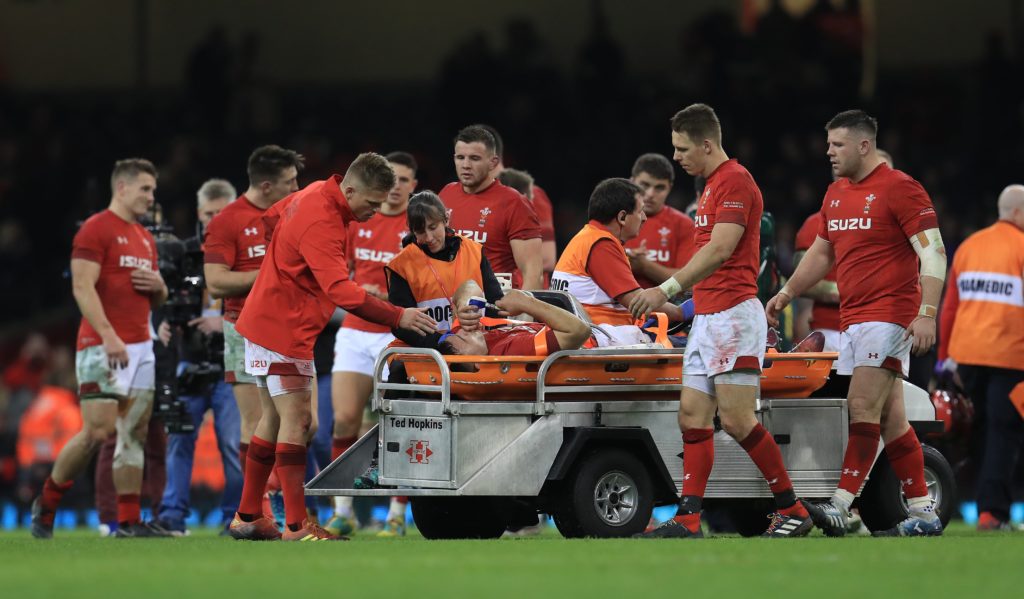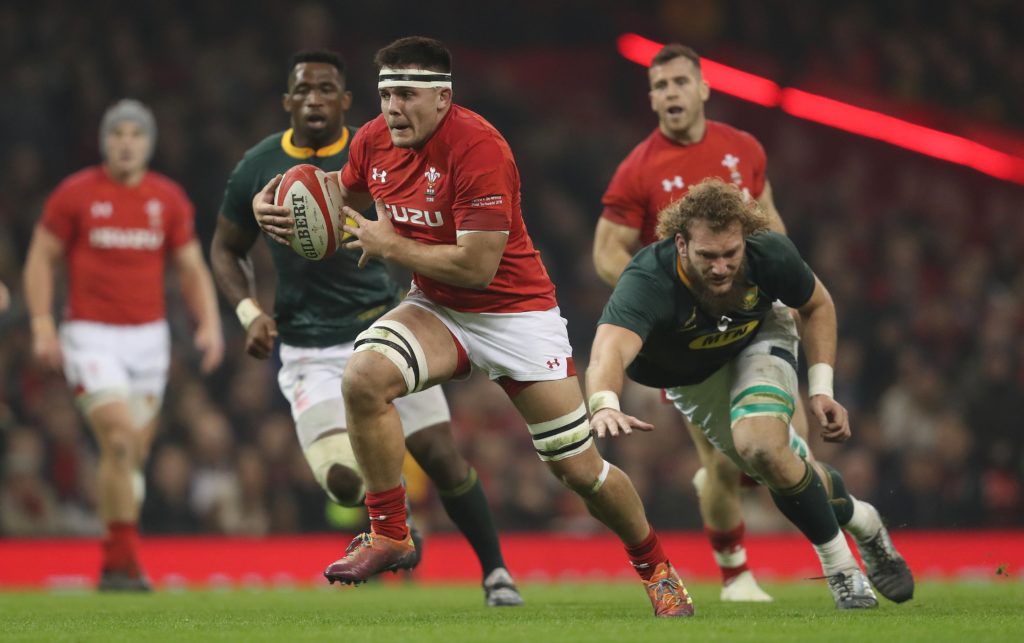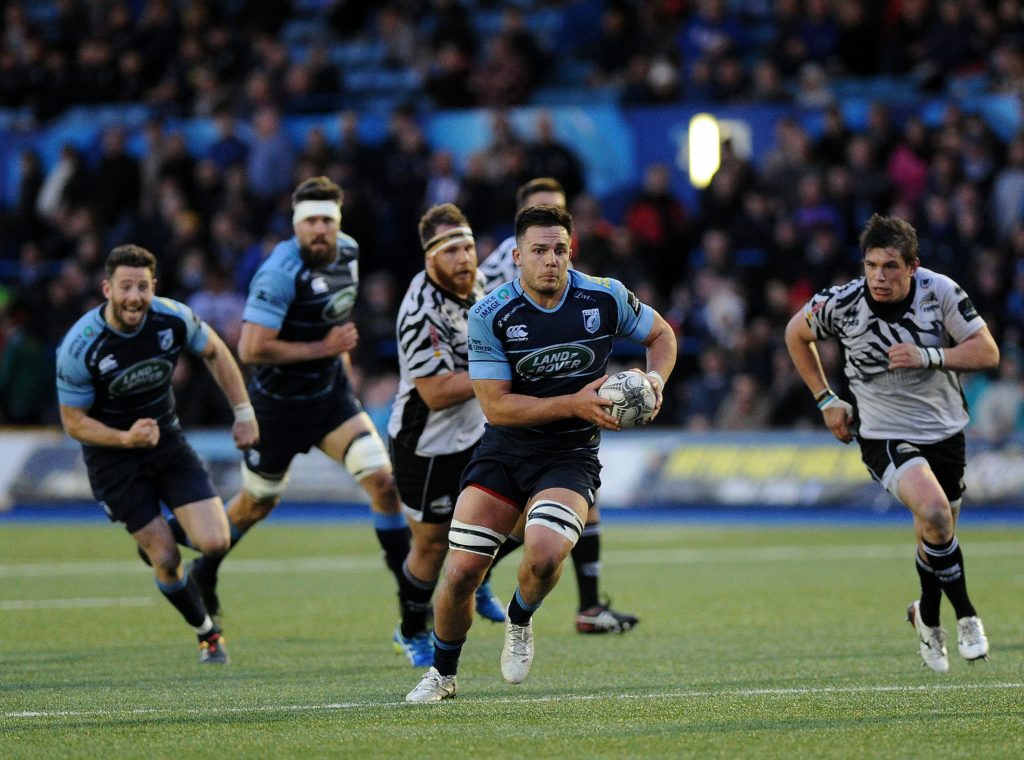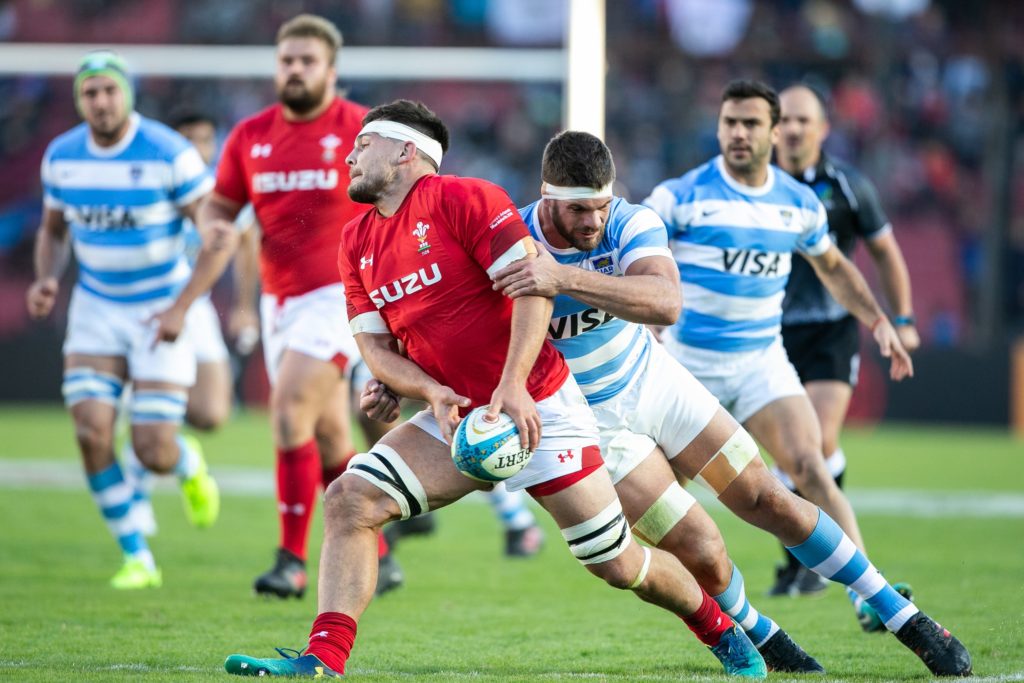When Ellis Jenkins stepped on the scales at his parents’ house on Christmas morning 2018, he weighed in at a modest 93kg. That’s just over 14.5st in old money. Five weeks earlier, he’d been rampaging around the Principality Stadium hurling his considerably larger frame into contact, en route to a man-of-the-match performance. During the month that followed, he abandoned his strict diet, gorging himself on chocolate and cake. Yet here he was, two stone lighter, and a pale shadow of his former self.
“The skin was the weirdest part for me,” he recalls during our chat in Cardiff’s Pontcanna Fields. “I’d pull my skin up from my thigh and it would be flapping back and forth. My knee was massive and deformed-looking, and my thigh was really skinny. It wasn’t pretty.”
In the 80th minute of the aforementioned match, when victory over the Springboks was assured, Jenkins entered a ruck to contest for the ball. He’d been doing it throughout the game, like a pickpocket pilfering the contents of a handbag under the nose of his victim. The Boks had had enough and when Handre Pollard and Eben Etzebeth combined to move him off the ball, he fell awkwardly. The pain was like nothing he’d experienced before. “I heard my knee snap, pretty much, so I knew it was serious,” he says, with comic understatement. “When you have an injury like that you can almost hear things popping off one by one. You can hear the crunching.”
It’s the physio’s job at this point to provide reassurance, but John Miles’ expression was far from encouraging. His knee didn’t even look like a knee anymore. It was a twisted, mangled mess, swollen beyond recognition.
His first priority was to get Jenkins on his back. “As he was rolling me, it was getting more and more painful, then there was a clunk, and a feeling of massive release,” Jenkins remembers, wincing slightly at the memory. Once he was on his back, the final whistle blew and a photographer captured an image that encapsulated perfectly the agony and ecstasy of Test rugby. In the background, Wales hooker Elliot Dee has his arms raised in triumph; in the foreground lies Jenkins, his features twisted into a mask of agony.

He remained on the pitch for several minutes after the teams had left the pitch and the fans were streaming out of the ground. When he eventually hobbled into the changing room on crutches, he was greeted by a spontaneous standing ovation. The game had marked his arrival as a serious Test player and he’d given lie to the theory that South Africa could only be beaten by being beaten up. Together with Justin Tipuric and Ross Moriarty, Jenkins had subdued the much vaunted, physically imposing trio of Duane Vermuelen, Siya Kolisi and Pieter-Steph du Toit. For 79 minutes, he was on top of the world; in the last minute that world came crumbling down.
What followed was two years of pain, misery, doubt and depression.
A consultation with the surgeon Andy Williams put paid to his remote World Cup ambitions. Any glimmer of hope was comprehensively snuffed out when Williams told him he might never play again.
If my girlfriend, Sophie, needed something carrying, I wouldn’t be able to do it. I could barely lift a shopping bag. I barely recognised myself.
Ellis Jenkins on his long road back to fitness
Jenkins had torn his anterior cruciate ligament, but the damage was so acute that the repair required a graft from his healthy left knee and the insertion of an artificial ligament to restore mobility. The priority was to get him walking again. Rugby could wait.
So he found himself, at his parents’ house during the holiday season feeling anything but festive. For someone whose identity is defined by athleticism and physical prowess, he felt weak and insubstantial. “For years you look in the mirror with your top off, and you’re a muscly bloke, then all of a sudden, you’re a different person,” he says. It was an emasculating experience. “If my girlfriend, Sophie, needed something carrying, I wouldn’t be able to do it. I could barely lift a shopping bag. It’s surprising how much your muscles work just moving around. I couldn’t put any pressure on the knee for six weeks and the weight flew off me. The painkillers suppressed my appetite and I wasn’t training, so I wasn’t getting as hungry. My quad was a quarter of the size it used to be. I barely recognised myself.”
Jenkins’ forthcoming battle would be a psychological one as much as a physical one. The road to recovery is rarely smooth, but there’s usually a sense that progress is being made. Targets are met, boxes are ticked and the light at the end of tunnel begins to glow.
For a long time, Jenkins found himself locked in an interminable Groundhog Day, where nothing seemed to be improving. “I was getting so much swelling,” he recalls. “I’d be icing my knees through the night, lying on the sofa with my legs above my head and it would start to go down, but as soon as we started rehabbing again it would puff back up and feel worse. So I’d wake up in pain, go through rehab and come home in pain. It consumes you and impacts everything. I’d arrive home in a shit mood, Sophie would ask what’s the matter and I’d say, ‘My knee’s hurting’, which sounds pathetic but, until you experience it, it’s tough to separate yourself from the injury because it’s always there.”

The monotonous nature of the physio, the endless repetition and the absence of progress drove Jenkins to the edge of despair. His natural optimism drained away and he was reminded of the injury’s debilitating effects at every turn. “There were times when I was in a shit mood for days and days,” he says. “Little things would constantly remind you. You’re walking across the road, a car comes round the corner and you react as you normally would, by trotting to the other side and you’d immediately seize up and think, ‘Shit that hurts. Don’t do that again’.”
Accepting an invitation to watch the Wales v England game during their charge to the Grand Slam, he was as ecstatic as any Welsh fan when Josh Adams crossed for the winning try. “I was buzzing at the end, not bitter at all, just genuinely pleased for the boys, but when they got into their huddle, I got really choked up. That was the moment I realised how much I missed it. I should have been in there,” he says.
People ask if I was gutted when Wales won the Six Nations. Not at all. I’m a big Wales fan anyway. I’d been with them and know how hard they’d worked and how much they’d deserved it.
Ellis Jenkins on Wales’ Six Nations triumph
It’s a cruel irony that Jenkins’ injury came at at time when Wales were recovering their mojo and in a parallel universe, I suggest, he could be a double Six Nations champion and a World Cup semi-finalist. “World Cup winner,” he corrects me, with only a hint of a smile. Who knows what might have happened if the sliding doors of opportunity and chance had opened or closed at different times. How often does Jenkins allow these alternate realities to invade his thoughts?
“You don’t dwell on the negatives too much. People ask if I was gutted when Wales won the Six Nations. Not at all. I’m a big Wales fan anyway. I’d been with them and know how hard they’d worked and how much they’d deserved it,” he says. “Some of my best mates were there: Cory Hill, Gareth Anscombe, Dillon Lewis. I’m so happy for them but you wouldn’t be a competitor if you didn’t feel like you wanted to be part of it.”
A rugby player’s calendar is a regimented affair. Weeks are planned meticulously to culminate in game day. Everything is tailored towards the weekend, where the fruits of hard labour are, hopefully, harvested. Without that rhythm, that sense of purpose, everything is cast in a gloomier light. By the summer of 2019, despite a rigorous physiotherapy programme, tirelessly overseen by the Blues’ Gruff Parsons, Jenkins was still struggling to walk. The knee would regularly swell to monstrous proportions and had to be drained of fluid to ease the pain.
“It’s your body’s way of telling you to stop using the joint because there’s something wrong, which is obviously evolution working its magic,” he says. “But it’s counter-productive for rehab because when you get a bit of fluid on the joint, your quad switches off, which leads to more pain, which switches your quad off even more. It’s chicken and egg. You need to build strong muscles to support the joint but the swelling prevents you building the muscle mass. Without the muscle mass, it’s tough to get rid of the swelling and the pain.”

A second operation was scheduled to clean out some of the scar tissue but progress was still painfully slow. Jenkins speaks with black humour about his permanent residency in “injury club”, recalling how some players would present with an injury, recover and return to play, before presenting with a different injury, while he was still locked in his perpetual cycle of misery and despair.
When the World Cup began, Jenkins’ mood darkened. His original, hopelessly optimistic target of being in contention for the tournament had long passed, but he was still a million miles from kicking a ball around the park, let alone competing at elite level. Watching it on television, he admits, “had more of an effect on me than I thought”. Nearly a year had passed, and he had precious little to show for it. He’d reached the end of his tether and confronted a thought that had been lurking malevolently at the back of his mind. Was this the end? At the climax of a particularly gruelling week, he thought he had the answer. He’d had enough. He wanted to quit.
I don’t know what happened, nothing specific triggered it, but I lost the plot. I was crying hysterical tears, struggling to catch my breath and I didn’t know why.”
Ellis Jenkins on reaching his nadir during rehab
“I’d been digging in, it had been a tough session and everything was hurting, my knee was swollen, there was loads of fluid on it, the other knee was hurting where the graft had been taken and I went home and said to Sophie, ‘I’m done’,” he says. “The last three weeks I’d been in so much pain, trying to push through it, and at no point had it got any easier. I can’t be doing this every day when I feel like I’m no closer to playing. I’d had my knee drained four or five times, been back and forth to see the surgeon and I’d hit the wall. What was I doing? I was pushing shit uphill trying to get the knee to stop hurting. I wasn’t being impulsive, I’d had enough, and was ready to give up.”
That weekend, Jenkins had what he described as “a bit of a meltdown”. His mental resolve melted away and he had a panic attack. “I don’t know what happened, nothing specific triggered it, but I lost the plot. I was crying hysterical tears, struggling to catch my breath and I didn’t know why,” he says.
It prompted a phone call to his personal development manager at the Cardiff Blues, who recommended a chat with the WRPA’s psychologist; an encounter that proved pivotal. “He told me I was thinking too much that something had been done to me and I had to go in and do all this rehab against my will,” he says. The psychologist encouraged Jenkins to see himself not as a victim, but as the master of his own destiny. “He said, ‘You don’t have to do it. It’s your choice. If you want to get back playing, then that’s your choice. These are just the steps you’ve got to take to do it’. It sounds simple, but it just flipped the mindset for me. It led to a total change of attitude. It was my decision to try to play rugby again; no one was forcing me to do it.”
Before the visit, he’d reached a point where he didn’t want to speak to anyone, preferring to send pre-recorded videos to his parents and his girlfriend rather than open up. It was his way of saying, ‘This is what I’m doing, this is what I’ve been up to, now don’t ask me about it’. The psychologist encouraged Jenkins to talk more, to share his frustrations and acknowledge the emotions he’d tried to bury.

The Blues’ strength and conditioning coach, Robin Sowden-Taylor, was another to offer solace and a supportive shoulder. “He took me for a coffee and a chat. He’d been through a similar period of rehab when his career came to an end and he spoke about his regrets. He persuaded me to tick all the boxes before making a decision, and give it everything I’ve got because you’re a long time retired,” says Jenkins.
Feeling refreshed and suffused with optimism, Jenkins entered a new phase in his recovery, which began with a trip to Philadelphia to meet the world-renowned ‘reconditioning specialist’ Bill Knowles. Knowles had worked with dozens of famous sportsmen and had personal testimonies from the likes of Andy Murray, Tiger Woods and the former England and Lions flanker Richard Hill. “In his gym, he’s got loads of hockey jerseys and football jerseys – Ballotelli’s shirt was there – and Richard Hill’s jersey is above his desk. It says ‘Dear Bill, thanks for the most rewarding two weeks of my life’. Basically saying how Bill had got him in shape for the Lions tour,” says Jenkins.
Jenkins had watched the Andy Murray documentary before his departure, and worried that Knowles – who features heavily – was a bit of a publicity-hungry charlatan. Once he got to work, he realised he was the real deal. He spoke about returning his knee to “homeostasis”, emphasising the need to keep the joint moving while respecting the surgery. There was a focus on games to take Jenkins’ mind away from the source of the injury. They spent as much time playing badminton and tennis as they did on the massage table. A sightseeing trip took in the famous “Rocky steps” but neither Jenkins nor Parsons were able to recreate the iconic scene. Parsons attempted it, but had run a half-marathon on an empty stomach that morning and had nothing in reserve, much to the amusement of Jenkins, who filmed the attempt on his mobile.
Before I could learn to play rugby again I had to learn to walk, to get my gait right, to walk down the stairs without stumbling.
Knowles’ honest assessment was that Jenkins was a way off playing again and would probably need a third operation. He was resigned to going under the knife again, but everything was put on hold as the Coronavirus pandemic swept the globe and all elective surgery was cancelled. It wasn’t until July of last year that he had the third and final operation, which led to a marked improvement in his mobility.
There were further setbacks and U-turns in the wake of the surgery, but his disposition was now sunnier and the light at the end of the tunnel had flickered back to life. Slowly, laboriously, he made progress. “Before I could learn to play rugby again I had to learn to walk, to get my gait right, to walk down the stairs without stumbling,” he says. “If you start running and you’re not quite running properly, you’ll have issues with your back and the other side of your body. Twenty months had gone by before I had to learn to tackle again and refamiliarise myself with the things I’d forgotten: getting your feet in the right place, your shoulder in the right place, getting your centre of gravity right.”
The day arrived when it was time to step back through the portal. His first tentative steps back in contact were taken with Blues coach T Rhys Thomas, a former international hooker. “It was all very controlled,” he remembers. “He’s got the ball, he’s running at me and I’m going to tackle him or vice versa, whereas in a game there’s someone running at me with a ball but there’s also someone else running at my outside shoulder who could be passed to, or if he doesn’t get passed to, he’s going to be cleaning me out.”

In other words, training one-on-one is easy compared to the uncontrolled chaos of a game; where you have to be as alert to what’s happening in your peripheral vision as you are to what’s unfolding in front of you. His movement in a straight line was fine; it was when he had to change direction that he struggled. The knee felt good, but he was clumsy and unresponsive. He smiles as he recalls being sidestepped by a number of back-five forwards. “The first time I dipped my toe back in full training it was hard, and I was rubbish,” he claims. “I missed two or three tackles, my technique was poor and sub-consciously I wasn’t fully committing to contact. I thought I was, but watching it back on the video, I wasn’t.”
810 days after the fateful jackal that robbed him of a place at the World Cup, Ellis Jenkins returned to the rugby field. The occasion was a friendly between the Cardiff Blues and the Ospreys, which he describes as a “perfect reintroduction”, featuring a mixture of young talent and academy graduates. He scored a try to cap off an assured performance and looked like he’d never been away. Within a month, he’d started three Pro14 matches against Connacht, Munster and Benetton and was awarded man of the match in two of them. His performances were combative, aggressive and fuelled by a sense of bottled-up rage. They marked an astonishing comeback and – despite his claim the commentators gave him the awards because “they felt sorry for him” – served as an announcement that he was back.
The next World Cup is two years away. Wayne Pivac has been in touch with some encouraging words and Gethin Jenkins has been on hand to offer support and advice.
A return with Wales is the aim
The frustration now for the workaholic Jenkins, is that he can’t do the “extras” after training that he used to. “I long for the day that’s not dictated by how swollen my knee is or how much pain I’m in,” he says. “I’ve picked up some niggles along the way trying to increase the load and it’s a balancing act. You can control what you do in training, but games are a different story. I could be running 5k or 8.5k. I could be making three tackles, could be making 23. That’s the tough thing. A couple of games in, my body’s taking longer than usual to recover.”
Time for once, though, is on his side. The Blues have a few weeks’ away from competition to prepare for the Rainbow Cup and the next World Cup is two years away. Wayne Pivac has been in touch with some encouraging words and Gethin Jenkins has been on hand to offer support and advice. Ellis Jenkins is under no illusions about the competition for back-row places in the Wales squad and doesn’t expect preferential treatment. “I’m not interested in Melon telling me how well I’ve played considering how long I’ve been out. I want to know how to improve and what to do better next week. He has always been very honest,” he says.
Gone is the pale pretender beset by mental demons and ground down by the endless drudgery of rehab. In his place is the bristling, powerful athlete who tamed the Springboks more than two years ago. Ellis Jenkins is two years older, two stone heavier, and ready to show the rugby world what it has been missing.
More stories from Ross Harries
If you’ve enjoyed this article, please share it with friends or on social media. We rely solely on new subscribers to fund high-quality journalism and appreciate you sharing this so we can continue to grow, produce more quality content and support our writers.



Comments
Join free and tell us what you really think!
Sign up for free